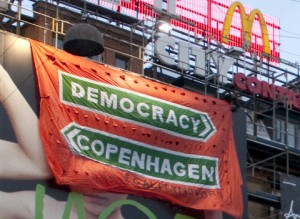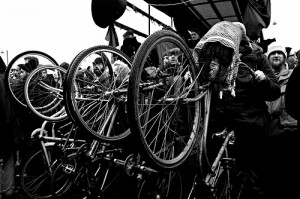Dispatches from Copenhagen III: Gearing Up for New Politics
Article published: Thursday, January 28th 2010
In another of our Copenhagen protest articles, Tom Jeffery recounts his experience of the practical side of radical politics: from the barricades to bicycle workshops…
The images of Copenhagen diffused across television screens and the internet could have left those not present pondering the existence of the alternative political movement that promised to come into life on the streets outside the summit. Where was everybody? Did these few hundred protesters, shivering and eyes streaming from the pepperspray used indiscriminately by Danish police, really amount to a global movement against climate change?
Yet I had arrived to an undeniably electric atmosphere. I experienced a succession of small but remarkable events taking place on city streets, in squatted rooms and detention centre cages. Within hours of arriving in the city, we had agreed upon ways of housing hundreds of foreign demonstrators, cleaning and maintaining our accommodation, keeping informed about what was going on all over the city, finding lost friends, even providing free food from local supermarket skips – not to mention having a go at changing the world.
Copenhagen is unreservedly a cycling city: all except the smallest streets have separate lanes and cyclists assert a calm ownership of the roads. There were abandoned bicycles all over the city, in various states of disrepair. I took one to a social centre called the Bolsjefabrikken, or ‘Candy Factory’, hearing that there was a cycle workshop there. I found something altogether different. In the yard of an old industrial premises, the dismembered, unloved and discarded bikes of Copenhagen were being reborn. People passed tools and spare parts while professional mechanics gave advice. Every so often a new contraption creaked into motion. Differences, linguistic and otherwise, dissolved into the common language of the bicycle. Soon enough, having never so much as changed a tyre in my life, I was on two wheels. More impressive than the gracious help I had received was the general ethos of the place – find a broken bike, fix it, and then get on it. No-one was there to do it for you, equally, no-one would object to lending a hand, a spanner, or their expertise.
 I wasn’t in Copenhagen for the cycling, however. To get a sense of what was going on, I visited another social centre, Ragnhildgade, for a Climate Justice Action network meeting. Room after room was filled with the hum of plans made, political discussions and news from the day’s events. I was soon helping to decide how the next day’s protest would take shape. Meetings carried on into the night, animated by our sense of purpose.
I wasn’t in Copenhagen for the cycling, however. To get a sense of what was going on, I visited another social centre, Ragnhildgade, for a Climate Justice Action network meeting. Room after room was filled with the hum of plans made, political discussions and news from the day’s events. I was soon helping to decide how the next day’s protest would take shape. Meetings carried on into the night, animated by our sense of purpose.
Copenhagen, if not quite our generation’s Seattle, was at least the framework for a new political paradigm. Foreign protesters brought their energy, inventiveness, and an almost intuitive ability to work together, while the network of social centres and the inspired and resourceful Danes facilitated this form of cooperation. Copenhagen, after all, is home to the free town of Christiana, which is still going strong some 40 years after the former military base was occupied and transformed into a massive democratic commune. Elsewhere across the city were media centres, legal advice points, medical aid, and kitchens all run by volunteers. I soon understood what an activist critiquing capitalism as lacking creativity meant: inside the Conference, our leaders clashed and bargained to no avail while outside the we made decisions through participatory and empowering means. The internationalism of our way of doing things is fitting for an economic crisis not contained by borders, but it had unexpected results, too, in the interaction between protesters and their host city. We neither took over the city or were received as unwelcome visitors: instead, the local involved itself with the international, and vice versa. After the last meeting at the Bolsjefabrikken we left our cycles there as a bike library.
The terms in which politicians frame the problematic, man-made climate change are technical and obfuscatory. They serve to separate the crisis from the population and prevent us from concretely addressing the issues brought in to focus by it. The beginnings of the movement out on the streets showed how an alternative way of organising and implementing politics on an autonomous basis is indeed possible. A more pragmatic and human approach coupled with all the creativity we can muster, will allow us to take an uncertain future back into our hands.
Tom Jeffery is the editor of Roundhouse: A Journal of Critical Theory and Practice, based at the University of Leeds
Images taken from ´1000 words and images´ photo blog on a Creative Commons license.
More: Features
Comments
No comments found
The comments are closed.




